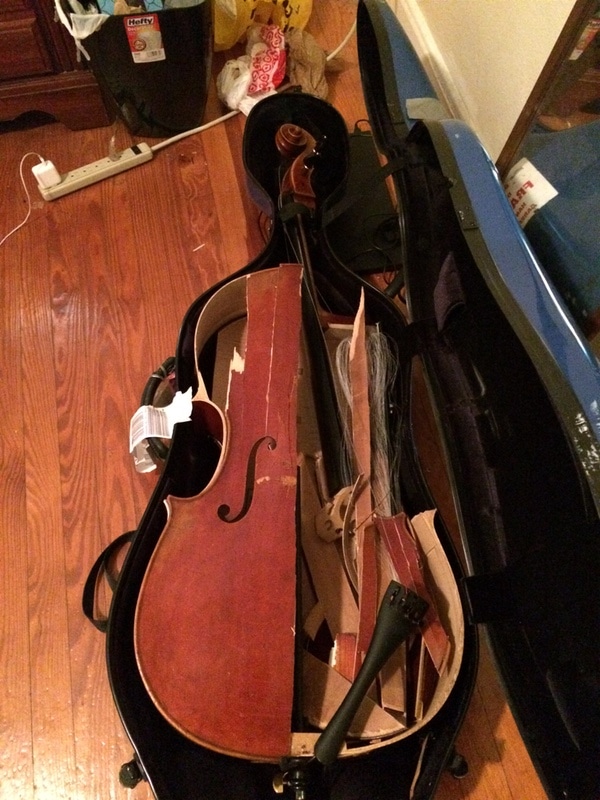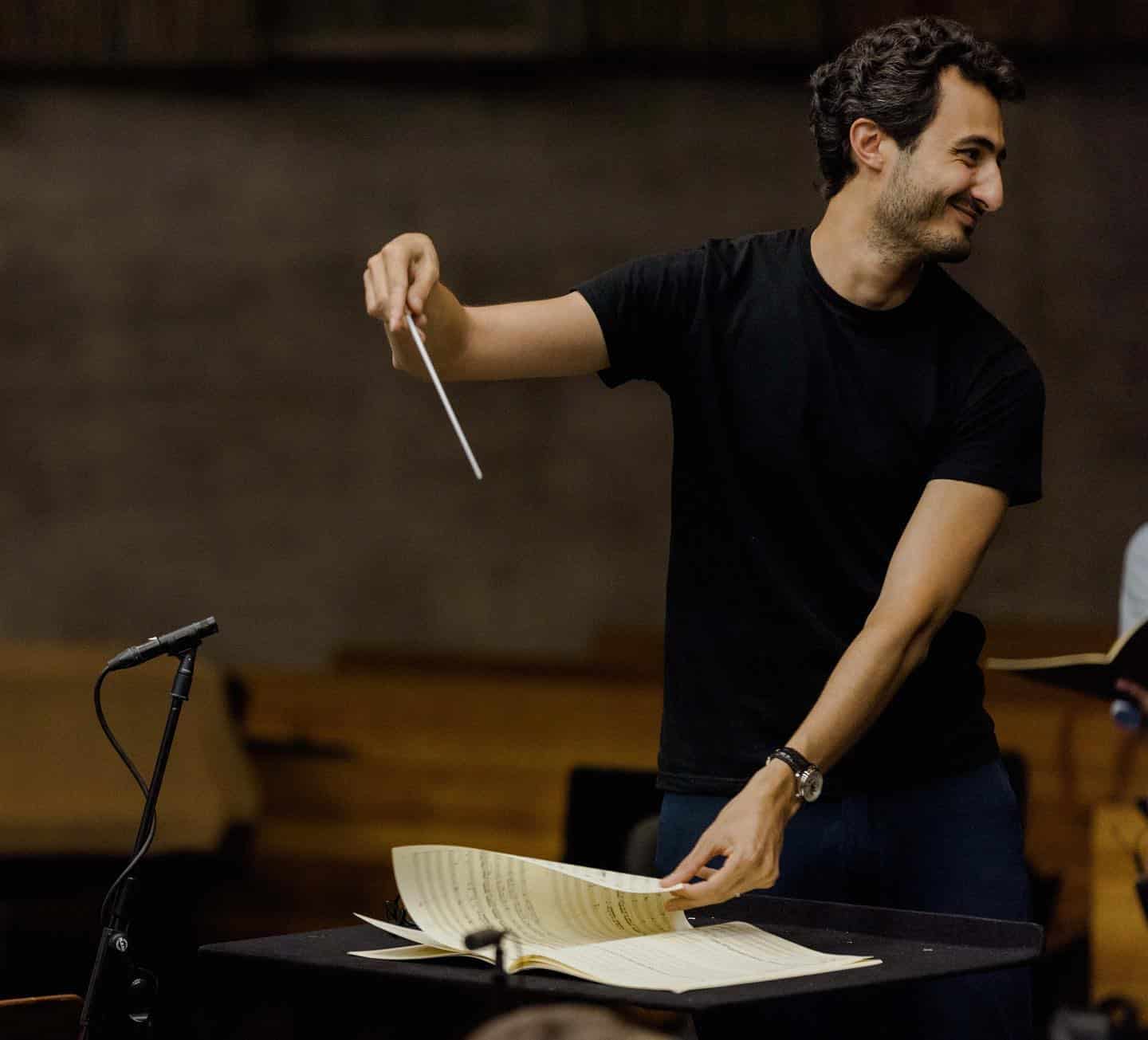United Airlines smashed my cello to pieces. Please help.
mainFrom a crowdfunder by Carrie Miller:

I am currently in the graduate music program in cello performance at Florida State University. During the winter break I traveled back to California to visit my family. I took my cello as I’ve done many times in the past. I wanted to be able to play with my friends, practice for my recital, and earn some extra money teaching students.
Whenever I fly, I always gate check my cello to ensure that it is properly handled. When I flew back to Tallahassee, United airlines did not allow me to gate check my cello. I pleaded with them saying that I have checked the cello many times in the past and was allowed to do so on my initial flight to California. They were completely unsympathetic refusing to allow me to be present during the checking process. There were no extra seats on the plane so I could not buy a seat for my cello. I couldn’t cancel my flight and was forced to check it through normal baggage procedures.
When I got back to Tallahassee, my instrument was completely broken. Not just parts of it. The whole instrument was in pieces as well as the case. Clearly the airline completely mishandled my cello. This incident has been incredibly traumatic. I’m currently using a loaned instrument that is inferior to my cello. This instrument negatively impacts my ability to perform at a high level causing my work at school to suffer and jeopardizing my livelihood.
Read on here.






Sue them!
I have every sympathy, but I am curious to know whether (a) this damage can be paid for out of the instrument’s insurance and/or (b) a claim can be made against the airline, which seems to be at fault.
It’s risky to check a cello even if it’s gate checked. It is still subject to dramatic changes in temperature and pressure. What kind of case was it in I wonder? Was it insured?
One piece of advice would be to make sure it was united airlines.. depending on the airport you flew out of and into will depend on the airline. I know your ticket and of course the plane would have said united but it could have been one of united contract carriors. You can go after that particular carior as well. Claim your insurance policy untill your get it worked out . How to find out if it was a contracted airline .. look closely at your ticket it will say united but in small print it will say another airline .. also you can go online and pretend to book that same flight and look carefully you will see if there is another airline involved .. these may be airlines you may have never heard of .
Not the first time… check out Dave Carroll, Sons of Maxwell, on You Tube.
Why is the airline not offering compensation??
I kind of had similar incident with United. I left my mobile onboard while flying back to Newark,NJ. I am sure it was in my seat. Inspite of giving all details about phone IMEI number etc they still say they have not found it. They put no efforts to customer need or belongings which are meant most.
Not a similar incident.
Maybe you should buy a sturdy case.
Lady, you have make the worst of all mistakes: You fly United.
Looking at that damage, repair hardly seems an option. Presumably there will be insurance. But does this not once again illustrate the problem of flying with valuable instruments and assuming that everything will go OK – only because there have been no problems in the past. Check-in and gate agents come and go and there is no certainty that new ones will know all the rules.
The type of case is also vital. I have no idea about the latest cases for cellos, but if lightweight suitcases can now be made from layers of carbon fibre type materials – rather like racing cars – and are all but indestructible, surely someone can come up with a design for instrument cases than are similarly lightweight and yet withstand not only normal airline handling but also being dropped from a considerable height?
I don’t believe the instrument was insured, it was a rather cheap cello. And she is trying to replace it with a 10k Cello, again, unlikely to be insured (musicians don’t usually insure instruments that are worth this little).
Regarding your comment about cases, the simple answer is no. Instruments are delicate, and shouldn’t be dropped from a considerable height under any circumstances. A drop from your shoulder, hitting the floor at the right angle generates enough energy to damage the instrument in a cheap case. Good cases are costly (in her case, probably as expensive as that cello). While a case by Musafia or Negri will protect your instrument better than others, it comes with a price tag to match and is heavier that carbon fiber cases. The issue with carbon fiber is that it cracks (badly!) under pressure, it gets punctured. That’s why professional case makers still use wood for their top of the line products.
I agree entirely. Instruments certainly should not be dropped from any height. But anyone leaving the future of their instrument to baggage handlers has zero choice – either expect the instrument to be damaged severely over time, or purchase a second seat (if that’s permitted by the airline), or get a case that will protect the instrument from bad handling as best as possible.
May’s comment below confirms there are better cases on the market. Of course they are going to be more expensive. I travel extensively and for multi-sector international trips of more than about 14 days I need a suitcase that will be light enough and robust enough to withstand being thrown around by airlines. My Tumi purchased almost 5 years ago was expensive. But it has been on close to 200 flights, never had a dent, never had a puncture, never cracked – in fact apart from surface scratching it’s virtually as good as new. A cello case made with a similar external material, the best absorbent padding material inside and a cavity crafted for the instrument would not be cheap. But if an instrument is your livelihood and you will have to travel with it, surely the cost of the best possible travelling case should be built in to price calculations before the instrument is purchased? You can say what you like about that making instruments too expensive. But we know what the alternative is!
“musicians don’t usually insure instruments that are worth this little”
Really? I would insure an instrument worth $10,000. Indeed, I have insured in the past instruments worth a fraction of that amount. $10,000 may well be cheap if you are talking about the kind of instrument that somebody might be using to play in the New York Philharmonic, but for a music student that is a lot of money and a valuable item. It’s about 40 times the value of the laptop I am typing on now, and I have insurance for that. Sure, it’s annoying if you end up not claiming on it, but I have had to claim on insurance and I was certainly pleased that I had it.
Yes, you insured yours, and most musicians don’t, my statement stands. The keyword is MOST.
Yes, I understand the point being made. I was just surprised by the claim. I honestly thought that most musicians would insure all of their instruments, at least one worth thousands of dollars. If I owned a cello worth £8,000 I’d think it was worth paying between around £60 and £220 p.a., depending on various options, in order to avoid potentially paying out £8,000 in one lump sum. I honestly thought that most people did the same thing.
Where did you find this statistic? I’m a professional musician and my instruments are insured. None is worth more than 13,000 euros, including a flight case (carbon-fiber, by the way; you’re wrong about that too). Most of my colleagues also insure their instruments. Other than members of the violin family, most professional-grade instruments aren’t extrodinarily expensive.
That is a good point. $10,000 may be relatively cheap for a cello (although it is hardly a negligible sum), but it’s quite expensive for something like a clarinet or a flute. I honestly doubt that somebody who owns a $10,000 flute would consider it to be a cheap instrument not worth insuring. I am pretty baffled by the whole argument, to be honest. I think a lot of parents take out insurance for the instruments that their children are learning on, which, in the case of a cello, could start at as little as a few hundred pounds.
I’ve contributed to her fund, but frankly I’m sick of this story. Bring the attachment to the instrument, the emotion, etc, but recast it this way…she shows up to the airport assuming her six year old can fly as an infant in arms because it’s worked in the past but this time is isn’t.
Not the airline’s fault you didn’t buy a seat ahead of time or none are available when the issue arises. Yeah, you know there are risks involved, but would you ever “check” your six year old? No, because you’d be afraid of the outcome that’s always the punchline to this story. But if you do “check”, admit you’re rolling the dice instead of making secure plans in advance for your “kid”.
1. It’s too bad that baggage handlers aren’t more careful with instruments.
2. It looks like the cello case was not thrown by the baggage handlers. My guess is that a lot of other luggage was piled on top, or it was placed in the hold in such a way, that another suitcase must have slammed into it when the airplane braked after hitting the tarmac.
3. That is a pretty cheap cello case. There are much better cases on the market that will withstand the weight of having other items packed on top of it.
4. I disagree with this use of crowd funding. Basically the community is being asked to pitch in because Ms. Miller chose not to insure her instrument. I hope she purchases a better case for her next instrument.
It should be covered under her parents’ homeowners insurance…
She studies in Florida where presumably she lives at lest 2/3 of the year. Her parents live in California. I’d like to meet the insurance agent — AMERICAN insurance agent: they are trained to obstruct payment — who goes for THAT as part of homeowners’ insurance! Especially if the claim came in because she had flown the instrument cross-country.
In future she might consider hiring a cello when she goes home if she wants to earn with one. Would cut down on the risk. But she is young, and has had previously a good experience so I think she might get a pass on this one.
I suffered some significant damage to my old English cello on a Delta flight. It was well packed and the case was also damaged. They paid my $3000 claim, which surprised me. The deciding factor seemed to be that the damage to the case indicated to them that it had been mishandled. Without damage to the case, they wouldn’t have considered paying. Also, I had to have the whole repair finished and a bill in hand before they would reimburse.
Lesson learned: NEVER BRING ANYTHING OF VALUE WITH YOU WHEN YOU TRAVEL! It’s only a recipe for disaster. I don’t even travel with fine clothes or jewelry any more. Of course you can make a claim against the airline and you will be reimbursed accordingly, however as a former employee of United, the company has outsourced so many jobs at airports, it may have been a contracted employee or a series of employees that handled your cello. In any event, contracted employees in particular have no vested interest in the airline whatsoever so it’s no wonder your instrument was mishandled. I truly understand how musicians are attached to their instruments. It’s like an extension of their arm or their personality. With the recent “United Breaks Guitars” dust up, this should send a loud and clear message to traveling musicians across the globe: THINK TWICE BEFORE TRAVELING BY AIR WITH YOUR INSTRUMENT or find a different method of shipping! The days of “best care in the air” are long gone.
That’s just unreasonable. It’s our profession to perform, and if you’re in a position where you’re travelling across a country, or to different countries you HAVE to fly.
GG clearly isn’t a musician and thinks we should just ship our instruments with the postal services. Do you happen to work for an airline too?
What would you rather get smashed by United Airlines: your cello, or your head?
I shared this on Facebook. I will continue finding these stories and sharing them. I hope many other people do to. Let’s put these assholes out of business.